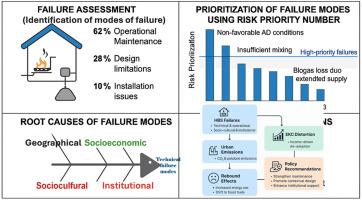了解尼泊尔家庭沼气故障:社会技术故障模式分析
IF 5.3
Q2 ENVIRONMENTAL SCIENCES
引用次数: 0
摘要
在发展中国家,家用沼气为传统的生物质烹饪提供了一种可持续的替代方案。然而,它们的长期功能经常受到技术、社会经济和制度障碍的阻碍。本研究的目的是系统地识别和优先考虑尼泊尔家庭沼气系统的主要故障模式,并了解社会技术因素如何加剧这些故障。利用社会技术系统理论结合的失效模式和效应分析,对尼泊尔两个生态区的384户家庭进行了实地调查。利用风险优先级数(RPN)从系统故障的角度对20种关键故障模式进行识别和排序。最关键的失效是厌氧消化条件不佳(RPN = 640)、混合不充分(RPN = 467)和稀释比例不合适(RPN = 403)。这些技术问题因社会经济障碍而加剧,如维修负担能力有限、与废物处理有关的社会文化耻辱以及安装后支助方面的体制缺陷。研究结果表明,基于绩效的补贴、用户培训、本地化设计改进和更强有力的维护服务对于维持家庭沼气的采用至关重要。虽然研究结果提供了对尼泊尔家庭沼气系统性能的诊断观点,但其影响延伸到国家在减缓温室气体排放、减少家庭空气污染、实现可持续发展目标和国家确定的贡献者目标方面的努力。本文章由计算机程序翻译,如有差异,请以英文原文为准。

Understanding household biogas failures in Nepal: A socio-technical failure mode analysis
Household biogas offers a sustainable alternative to traditional biomass-based cooking in developing countries. However, their long-term functionality is often hindered by technical, socioeconomic, and institutional barriers. The aim of this study is to systematically identify and priorotize the major failure modes of household biogas systems in Nepal and understand how sociotechnical factors exacerbate these failures. Using failure mode and effects analysis integrated with sociotechnical systems theory, a field survey of 384 households was conducted across two ecological regions of Nepal. Twenty (20) key failure modes were identified and prioritized from system failure's perspective using risk priority number (RPN). The most critical failures were non-favorable anaerobic digestion conditions (RPN = 640), insufficient mixing (RPN = 467), and improper dilution ratios (RPN = 403). These technical issues were intensified by socioeconomic barriers such as limited affordability of maintenance, sociocultural stigmas related to waste handling, and institutional shortcomings in post-installation support. The findings suggest that performance-based subsidies, user training, localized design improvements, and stronger maintenance services are vital for sustaining household biogas adoption. Although the findings offer a diagnostic view of household biogas system performance in Nepal, their implications extend to national efforts in GHG emission mitigation, household air pollution reduction, progress toward sustainable development goals and nationally determined contributor targets.
求助全文
通过发布文献求助,成功后即可免费获取论文全文。
去求助
来源期刊

Cleaner and Responsible Consumption
Social Sciences-Social Sciences (miscellaneous)
CiteScore
4.70
自引率
0.00%
发文量
40
审稿时长
99 days
 求助内容:
求助内容: 应助结果提醒方式:
应助结果提醒方式:


